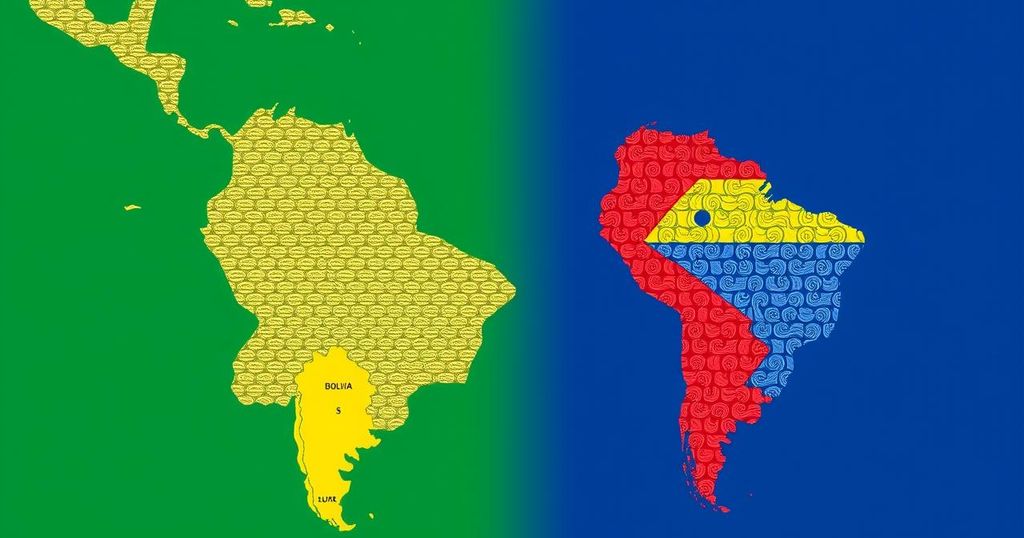Economic Struggles in Bolivia and Venezuela: Lessons for South America
South America faces economic challenges exemplified by the crises in Bolivia and Venezuela, revealing the vulnerabilities of resource dependence and political instability. Bolivia contends with declining natural gas production and political infighting, while Venezuela suffers from oil dependency and authoritarian rule. Both nations demonstrate the need for significant economic and political reforms to avoid cycles of fragility.
South America, endowed with vast natural resources, confronts economic challenges that underscore the fragility of its political and economic structures. A poignant examination of Bolivia and Venezuela reveals the vulnerabilities inherent in resource-dependent economies. Both nations exhibit distinct challenges; however, their crises stem from similar issues of economic mismanagement, dependence on natural resources, and political instability.
Bolivia, which was once celebrated for its resource-driven growth, now faces a decline in its natural gas output. For an extended period, natural gas has been central to Bolivia’s economy, significantly contributing to government revenues. Nevertheless, a lack of investment in exploration and production has resulted in a drastic reduction in exports, plummeting nearly 40 percent by 2023. This decline has weakened Bolivia’s trade balance and drained its foreign reserves. Political instability further complicates the situation, as President Luis Arce grapples with internal opposition, notably from factions loyal to former president Evo Morales. The prevailing tensions contribute to a political stalemate that hinders essential reforms and ignites social unrest as inflation surges, leading to a scarcity of essential goods.
Conversely, Venezuela’s predicament serves as a cautionary tale regarding reliance on oil. Once enjoying significant wealth due to its abundant oil reserves, Venezuela’s economy has suffered catastrophic decline due to overdependence on oil exports, corruption, and mismanagement. The collapse of oil prices in 2014 initiated a downward spiral, worsened by international sanctions imposed on the Maduro administration. Hyperinflation soared to an astronomical 1,700,000 percent in 2018, decimating the populace’s purchasing power while essential commodities remain in short supply. The exodus of approximately 7 million individuals fleeing the country signifies one of the largest migration crises in contemporary history. President Maduro’s autocratic governance has suppressed dissent but failed to address the underlying economic issues, perpetuating stagnation and repression.
Analyzing the crises in both nations reveals patterns of resource dependence and the consequences of political instability. The dependence on hydrocarbons—natural gas in Bolivia and oil in Venezuela—rendered them susceptible when global commodity prices fell, further exposing their economic vulnerabilities. Governmental failures to diversify their economies entrenched these weaknesses. Political struggles have exacerbated economic hardships, with Bolivia experiencing internal governance paralysis, while Venezuela’s authoritarianism has isolated the nation from potential allies.
Despite their commonalities, Bolivia and Venezuela adopt divergent strategies in response to their respective crises. Bolivia, under President Arce, has pursued efforts towards economic stabilization through foreign investment and export diversification, although these initiatives are hampered by political discord and inadequate infrastructure. In stark contrast, Venezuela has continued to exercise authoritarian control, seeking to circumvent sanctions by strengthening partnerships with nations like China and Russia. While these efforts may provide temporary relief, they ultimately fail to remedy the foundational economic problems.
The ongoing crises in Bolivia and Venezuela impart vital lessons for South America as a whole. They underscore the dangers of resource dependency and highlight the consequences of political mismanagement. The experiences of these nations call for comprehensive reforms that encompass both economic and political dimensions to foster resilience and inclusivity within their economies. The trajectory South America chooses in confronting these challenges will determine whether it emerges more robust or remains ensnared in cycles of economic fragility and political unrest.
The article examines the economic crises currently afflicting Bolivia and Venezuela, two South American nations characterized by their resource-rich environments but plagued by significant economic and political challenges. It illustrates how their crises expose the vulnerabilities associated with dependency on natural resources and the impact of political instability on economic management. Both countries serve as case studies on the repercussions of failing to diversify their economies and address internal governance issues, offering crucial lessons for the broader continent.
In summary, the economic crises in Bolivia and Venezuela reflect the significant risks associated with reliance on natural resources and highlight the devastating effects of political instability and mismanagement. Both nations illustrate the necessity for South America to implement comprehensive reforms aimed at diversifying their economies and strengthening political frameworks. The outcomes of these reforms will play a critical role in determining whether the region can achieve sustainable economic growth and political stability in the future.
Original Source: www.firstpost.com




Post Comment